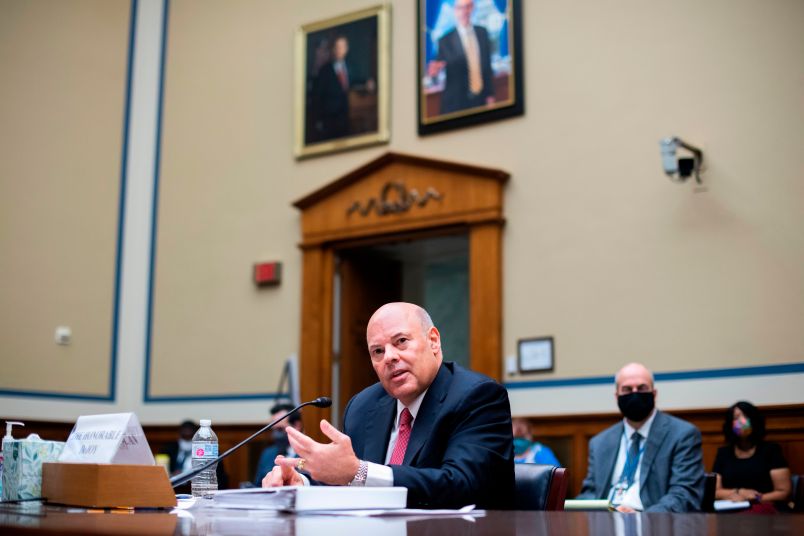The House’s turn to grill embattled Postmaster General Louis DeJoy brought little new insight into how the U.S. Postal Service will approach an unprecedented surge in vote-by-mail this fall, amid turmoil that has been caused, in part, by some of the policies DeJoy has implemented.
After DeJoy gave several key assurances to the Senate in testimony on Friday, he resisted requests from House Democrats that he flesh out for them the details of those plans and put them in writing.
Asked by Rep. Ro Khanna (D-CA) to share USPS’ specific plan to deliver election mail on time, DeJoy stumbled, murmuring something about “normal processing procedures” and “enhanced” election procedures before saying simply, “I can probably give you some type of summarized objectives that we’ll try to fulfill.”
Much of the hearing focused on DeJoy’s move to roll out a plan this July that emphasized trucks sticking to their delivery schedules, which DeJoy himself acknowledged had caused slowdowns in service that USPS is still working on fixing.
DeJoy refused to take accountability for other USPS changes — and particularly the removal of delivery boxes and the decommissioning of the mail sorting machines — that have fueled widespread concern about how slower service could hamper the ability for ballots to get to and from voters. While DeJoy touted his move to suspend those changes, Democrats struggled to elicit any new answers about why they were ordered and why the sorting machines weren’t being reinstated.
Senate Promises Don’t Match What USPS Has Put In Writing
Even getting more clarity from DeJoy about election-mail specific promises he made to the Senate proved challenging for House Democrats. Election wonks have questioned whether USPS will continue its past, informal practice of expediting ballots sent to voters using the cheaper marketing mail service — which is usually slower — so that they’re given priority akin to first class mail.
Despite a shift in messaging in recent months indicating that USPS would not be delivering ballots sent via marketing mail any more quickly than its standard guidelines, DeJoy promised on Friday that USPS would employ “processes and procedures to advance the election mail, in some cases ahead of first-class mail.”
However, as Rep. John Sarbenes (D-MD) noted, a USPS election mail website launched hours after DeJoy’s Senate testimony still uses the rhetoric that had set off the initial alarm bells by warning election officials that using marketing mail “will result in slower delivery times” and heighten risks of voters not having enough time to send their ballots back.
Asked for a written memo outlining the USPS’ plan to guarantee the treatment of all election mail as if it were first-class, DeJoy didn’t have an answer.
“I don’t — our processes to do that, physically … I’ll have to get back to you on what I can give you in writing on that,” he said.
A Vow To Work On Postmark Issues
DeJoy did bring some clarity to an election-related issue that had previously gone unaddressed, but ironically it was in response to a GOP line of questioning that appeared designed to criticize Democrats for voting on a USPS bill on Saturday before DeJoy had even come to testify before them.
Rep. Fred Keller (R-PA) brought up an issue that has plagued some primaries. Because USPS doesn’t typically postmark mail sent with prepaid postage, some ballot envelopes that have been prepaid by elections officials for their trip back from voters did not get postmarks, causing headaches in states that otherwise allow ballots that come in a few days after an election to be counted as long as they have a proper postmark.
Keller brought up the debacle to point out that the Democratic legislation adopted by the House would not have let USPS keep working on a fix for the issue. In the process, DeJoy confirmed that USPS is working on a process “to postmark as much as we can.”
But with the lack of details, and with his reluctance to commit to providing additional information on other related election issues, Democrats weren’t convinced that he was up to the task of managing USPS while it was playing such a critical role in the election. Several Democratic members asked for his resignation.
Concerns About DeJoy’s ‘Understanding of This Agency’
Toward the end of the hearing, Rep. Katie Porter (D-CA) quizzed DeJoy on a series of basic Postal Service questions: What’s the cost of a first-class stamp? The cost to mail a postcard? What’s the postage square envelope?”
Exasperated, DeJoy eventually said: “I will submit that I know very little about a postage stamp.”
Rep. Porter questions Postmaster General DeJoy: pic.twitter.com/mc0j367zb0
— Matt Shuham (@mattshuham) August 24, 2020
Porter was just getting started. She asked whether DeJoy knew, “within a million or so,” how many people had voted by mail in 2016. He didn’t. What about to the nearest 10 million? She asked. DeJoy chuckled to himself then said, “I would be guessing. And I don’t want to guess.”
“I’m concerned,” Porter responded. “I’m glad you know the price of a stamp. But I’m concerned about your understanding of this agency.”



